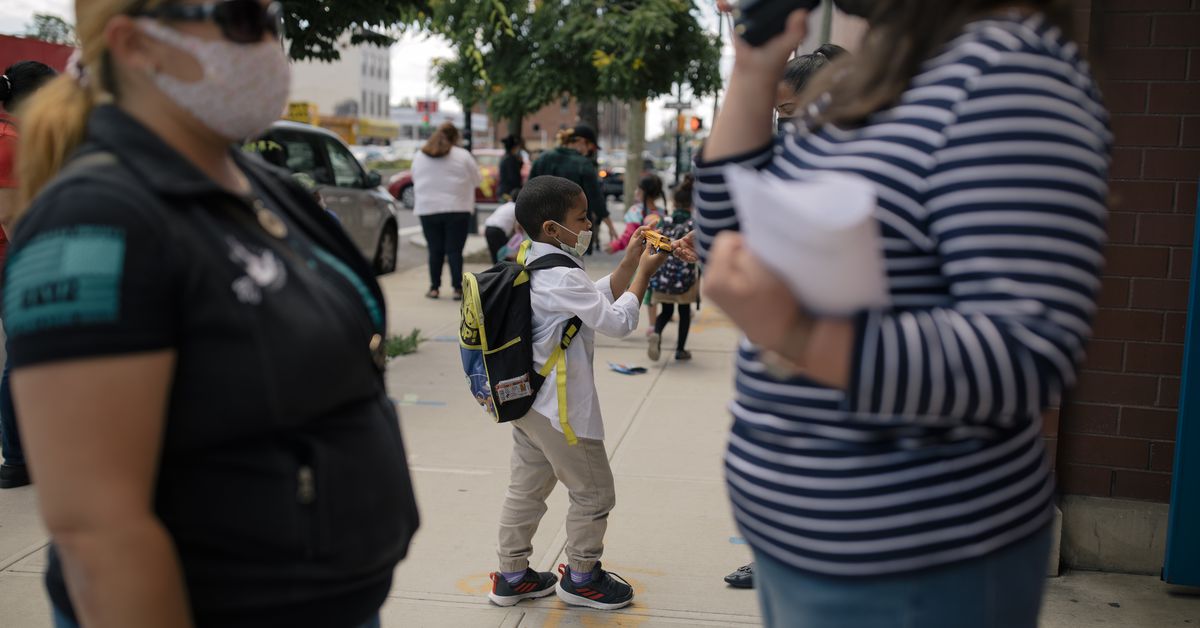Mental health fears cloud school reopenings
Editor’s Note: Welcome to Weekly Education: Coronavirus special edition. Each week, we will explore how the pandemic is reshaping and upending education as we know it across the country, from pre-K through grad school. We will explore the debates of the day, new challenges and talk to movers and shakers about whether changes ushered in now are here to stay.
This newsletter is a weekly version of POLITICO Pro’s daily Education policy newsletter, Morning Education. POLITICO Pro is a policy intelligence platform that combines the news you need with tools you can use to take action on the day’s biggest stories. Act on the news with POLITICO Pro.
THE WELLNESS CHECK — The Biden administration and teachers unions are mounting a campaign to return American children to classrooms five days a week.
“Nothing should stand in the way of fully reopening our public schools this fall and keeping them open,” said Randi Weingarten, American Federation of Teachers president, in a speech last week. But she also emphasized that the full return won’t be as easy as reopening the school gates. Educators will have to address students’ emotional needs on top of their academic setbacks.
— The prolonged isolation kids across the nation endured during the pandemic has exacerbated their need for social and emotional support. From April through October, the number of children ages 5 to 11 who were sent to a hospital emergency room due to a mental health crisis spiked by 24 percent compared to 2019, the CDC reported. For 12- to 17-year-olds, that was a 31 percent jump.
— Teachers are also exhausted from trying to engage their students through a screen. And almost half of principals said pandemic working conditions were “accelerating their plans to leave the profession,” according to a poll from the National Association of Secondary School Principals.
— As the school year comes to a close and focus turns to the next academic year, lawmakers and education groups are urging Congress and the Biden administration to ensure that schools have the resources to meet their students’ most urgent social and emotional needs when they do at last return.
IT’S MONDAY, MAY 17. WELCOME TO MORNING EDUCATION.Let’s grab virtual coffee. Ping me at [email protected] to chat. Send tips to my colleagues Juan Perez Jr. at [email protected], Michael Stratford at [email protected] and Lauraine Genota at [email protected]. And follow us on Twitter: @Morning_Edu and @POLITICOPro.
CORTEZ MASTO’S MENTAL HEALTH APPROPRIATIONS PUSH — Sen. Catherine Cortez Masto (D-Nev.), plans to send a letter calling on Congressional appropriators to invest $500 million in mental health grants programs, she told your host in an interview. The Nevada Democrat has been at the forefront of pushing for more assistance for schools where students are struggling.
— The senator said she will request $250 million for Mental Health Services Professional Demonstration grant program and another $250 million in the School Based Mental Health Services grant program, which helps increase the number of mental health service providers in schools.
— Suicide is the second-leading cause of death for 10- to 34-year-olds, according to the CDC. Clark County School District in Nevada saw 18 suicides over the course of remote learning in 2020, double the number of incidents in all of the previous school year.
— “I have seen in my state even more stressors on our students, particularly with the horrific student suicide rates that we’ve seen,” Cortez Masto told your host. “It is important that we continue to fund it.”
— She emphasized that the federal government needs to give states and schools guidance on how to leverage cash from the American Rescue Plan to address students’ mental health. Last month, Cortez Masto sent a letter to Health and Human Services Secretary Xavier Becerra and Education Secretary Miguel Cardona asking them to work together and direct their departments to develop trauma-informed guidelines for educators and community-based providers.
— “I don’t want them working in silos … because there is a role for them to play when our state plans come together,” she said of the two secretaries. This issue “requires this cooperation at the federal and state and local school districts, and to me, that’s key here,” she said. “I wanted them to know that I fought for this money for the specific purpose to address the mental health needs of our students.”
STATES LOOK TO BOLSTER MENTAL HEALTH PROGRAMS — State policymakers have introduced more than 600 bills related to student mental and behavioral health since 2019, the Education Commission of the States reported this month. More than 30 states have collectively enacted at least 72 bills in the last few years, the report found, and some governors have indicated student mental health is a priority for their states.
— Meghan McCann, senior policy analyst at the Education Commission of the States, said that the pandemic put “spotlights on social and emotional learning and mental health and wellness in school reopening plans last spring and summer.” During summer 2020, the commission found, at least 43 states specifically addressed social/emotional learning and mental health and wellness in their reopening plan guidance for districts, and suggested teacher training, community resources, mental health screenings in schools and more.
— Alyssa Rafa, a senior policy analyst at the commission, said bills to relax school attendance policies could be “an up-and-coming trend” in school mental health legislation. “Allowing mental health or behavioral health to be a verified cause for an excused absence is something that we’re seeing in a few different states over the last two years,” she said.“In Arizona and Utah, there are two bills so far in that space.”
ADVOCACY GROUPS WANT MORE GUIDANCE TOO— Amy Kennedy, who is the education director of the Kennedy Forum, a mental health advocacy group, and a board member of Mental Health America, is urging the Biden administration to tell schools that student mental health is a high priority.
— “We know that these funds are short-term resources and also know we are going to have a long-term problem,” she said. “Being able to continue to make the funds available and know how to spend them in a way that will be most useful in addressing our current needs is going to be key.”
— Making sure that there is long-term funding to continue to deliver mental health services on school sites once stimulus funds are depleted could be a challenge, Kennedy added. “Part of the frustration of really setting up a good program is whether or not the resources will continue to be there to keep it going,”she said.
— At least 70 percent of students who receive mental health services start getting them in a school-based setting, according to the Education Commission of the States. Delivering services on campus could “reduce the stigma and make it more accessible for so many students who otherwise wouldn’t be able to get this treatment,” Kennedy said.
EXCLUSIVE: SURVEY FINDS CHILDREN’S BEHAVIOR CHANGED DURING PANDEMIC — About half of all parents noticed behavioral changes in their child since the beginning of the pandemic, a survey supported by disability advocacy nonprofit Understood found. But parents of children with learning disabilities were more than twice as likely to report behavioral changes. Distance learning has also prompted about 72 percent of all parents to notice their child’s learning challenges.
— Additionally, the survey found that nearly half of parents with children with learning disabilities reported their child was suffering from “high to extreme levels of school-based anxiety since the pandemic.” Nearly 60 percent of those parents also said their kid was a year behind in school and may never catch up.
— Nathan Friedman, a spokesperson for Understood, recommended that parents try the ‘three C’ approach. Parents should confirm the educational challenges their kids are facing; consult a teacher, caretaker or pediatrician about issues like anxiety or depression; and communicate with their child about how they are feeling and what can be done to support them.
— Friedman also emphasized that parents are also feeling the toll the pandemic has taken on their child and noted the importance of support communities to help parents not feel isolated. About 57 percent of parents of kids with learning disabilities “feel like they are the only one who sees their child’s challenges,” per the survey. More for Pros from your host.
— A new report from the Center for American Progress outlines how federal investments in school infrastructure could spur greater action against climate change.
— Legal scholars question Tennessee’s new bill restricting how educators teach about racial injustice: Chalkbeat Tennessee
—In a dark year on campus, some surprising glimmers of light: The New York Times
— In the pandemic, children face a mental health crisis: NPR







